Unit 1 What's the matter? Section A课件 (40张PPT)
文档属性
| 名称 | Unit 1 What's the matter? Section A课件 (40张PPT) | 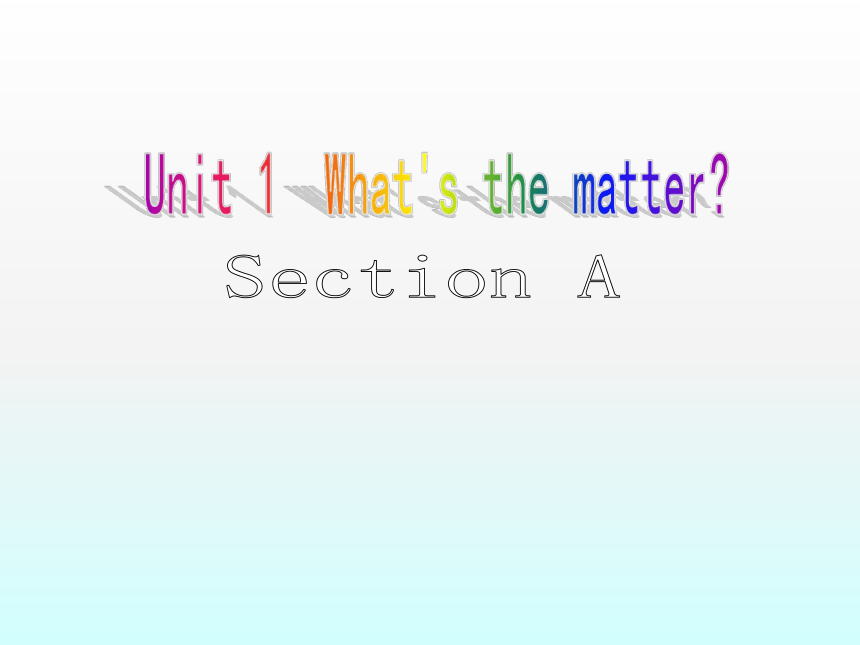 | |
| 格式 | ppt | ||
| 文件大小 | 1.3MB | ||
| 资源类型 | 教案 | ||
| 版本资源 | 人教新目标(Go for it)版 | ||
| 科目 | 英语 | ||
| 更新时间 | 2022-03-23 21:42:52 | ||
图片预览

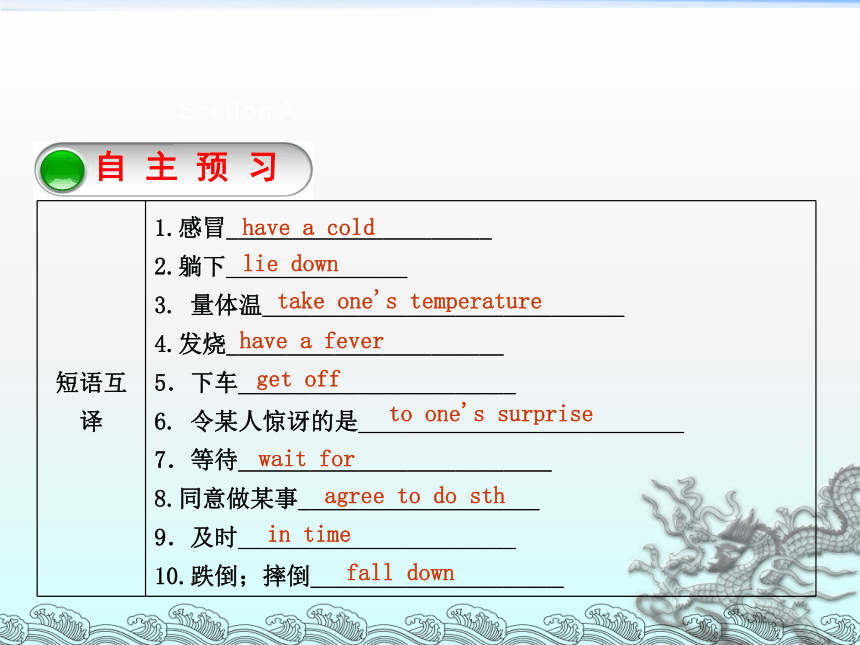
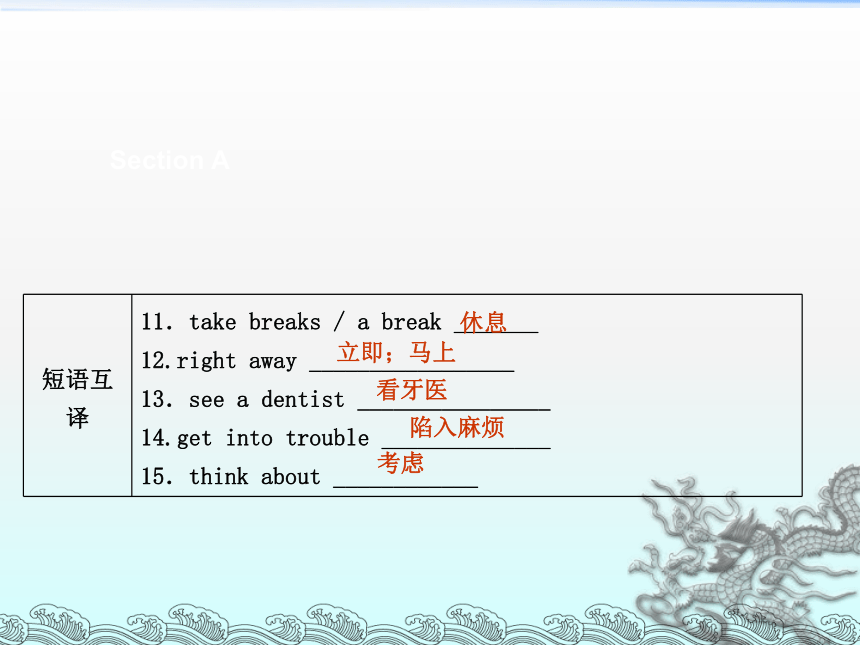
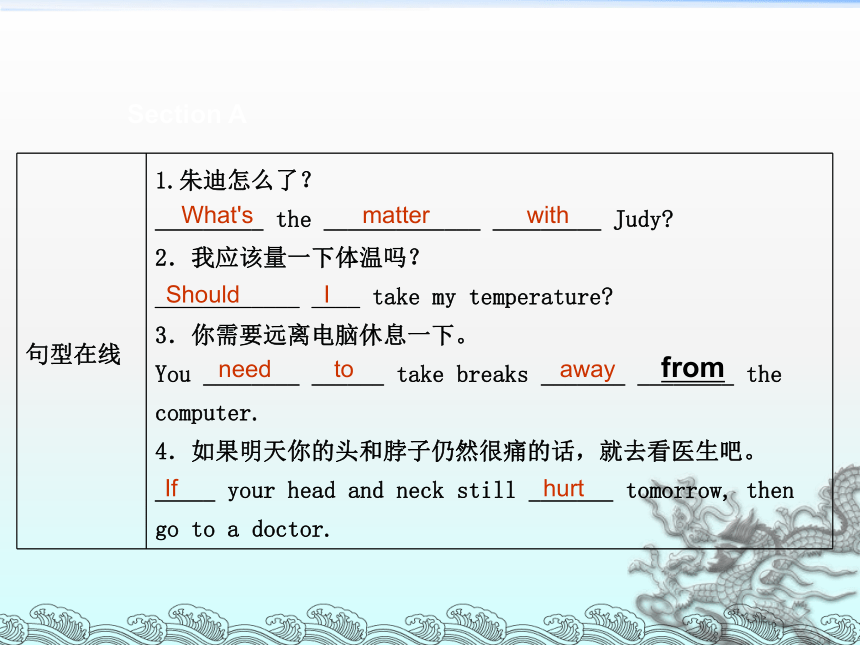
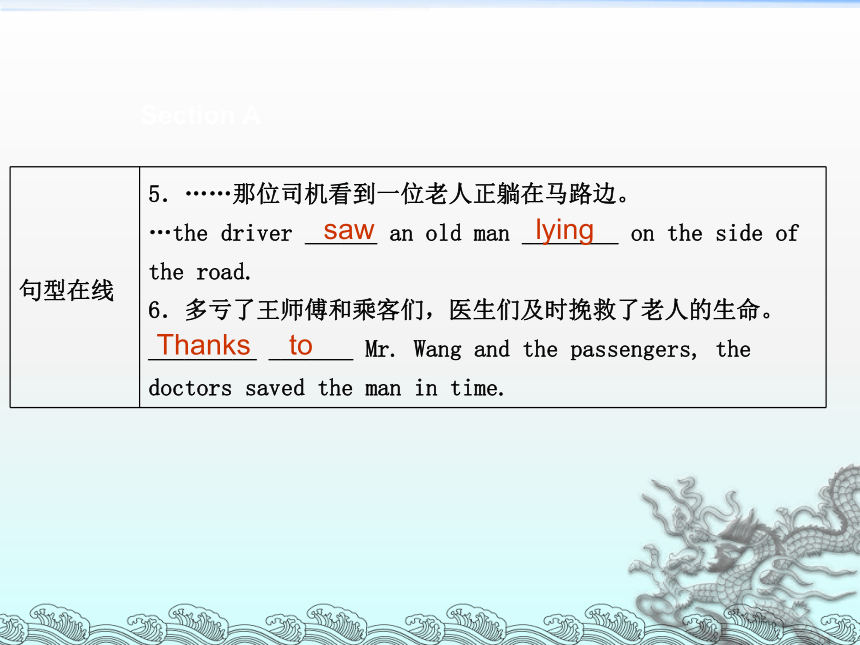
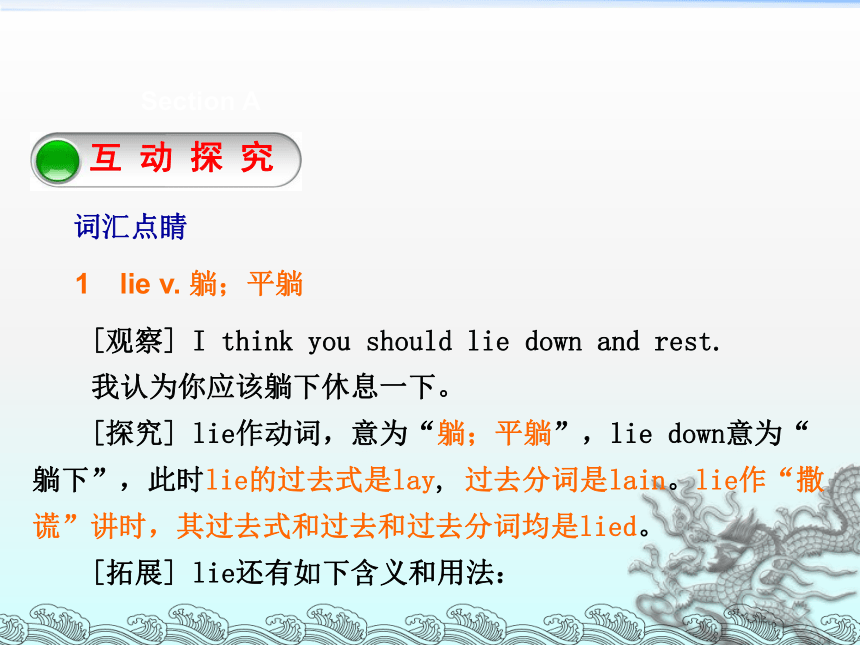
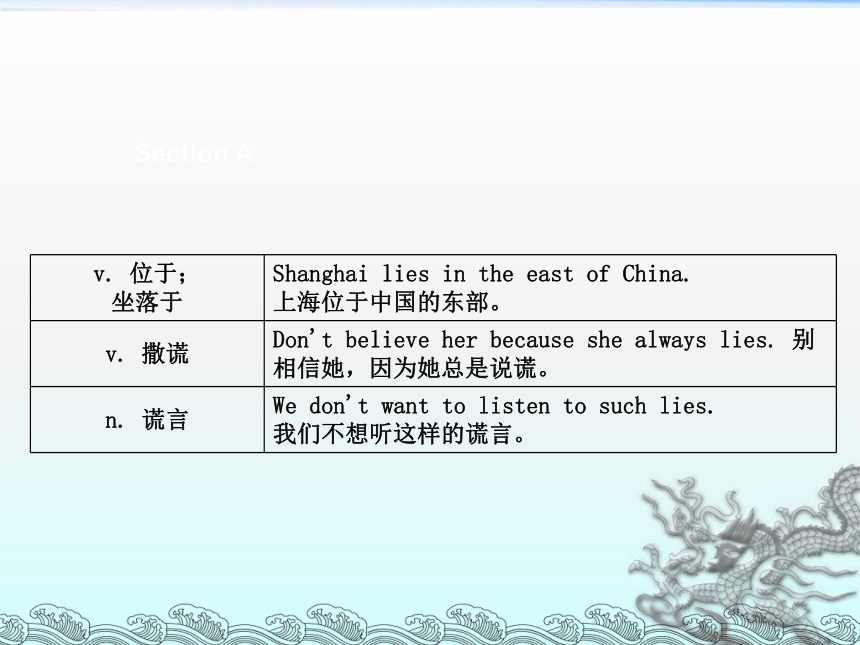
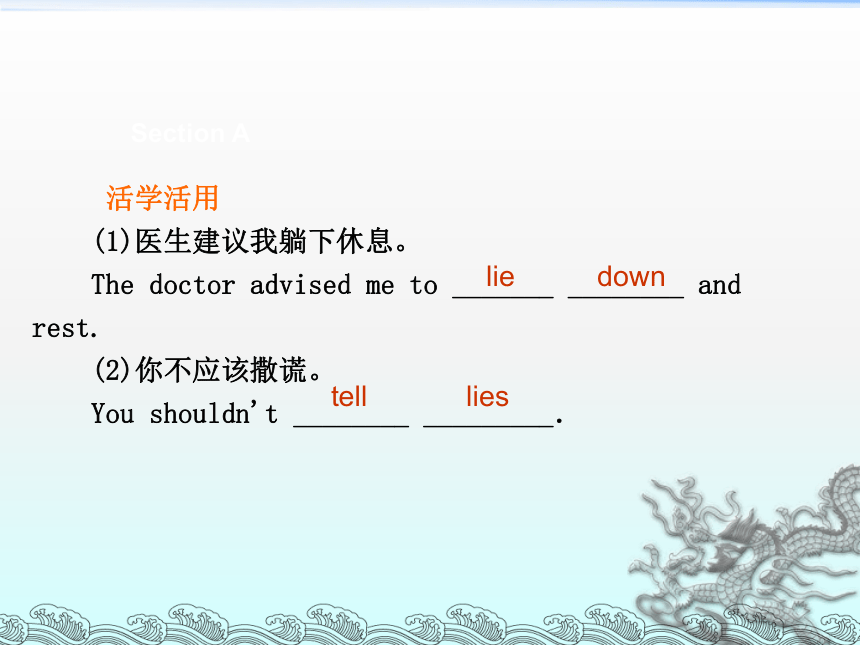
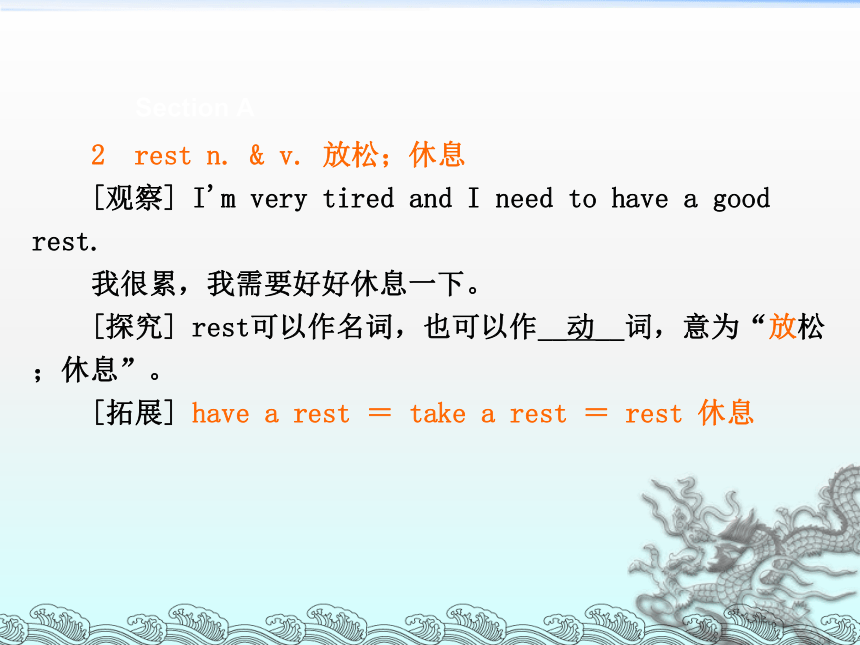
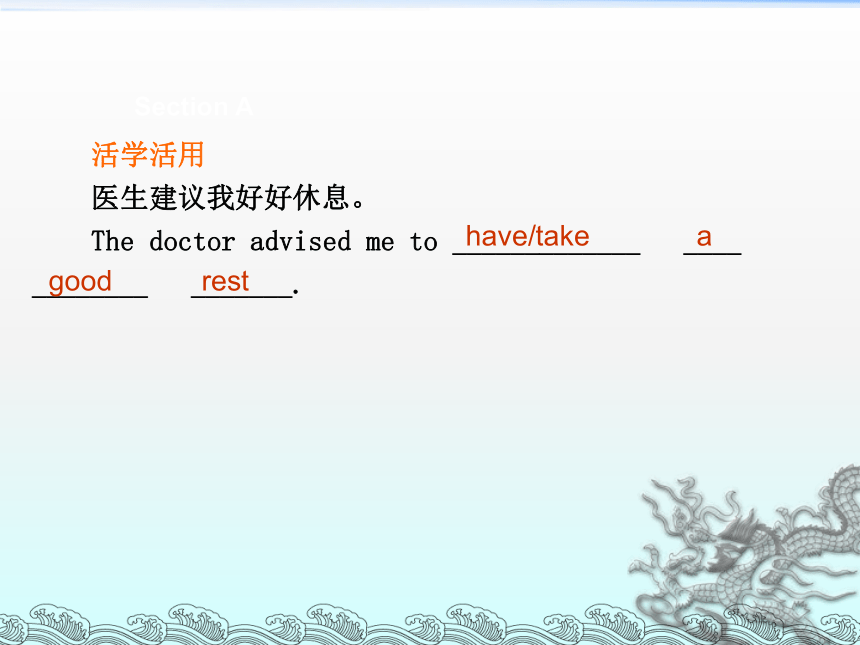
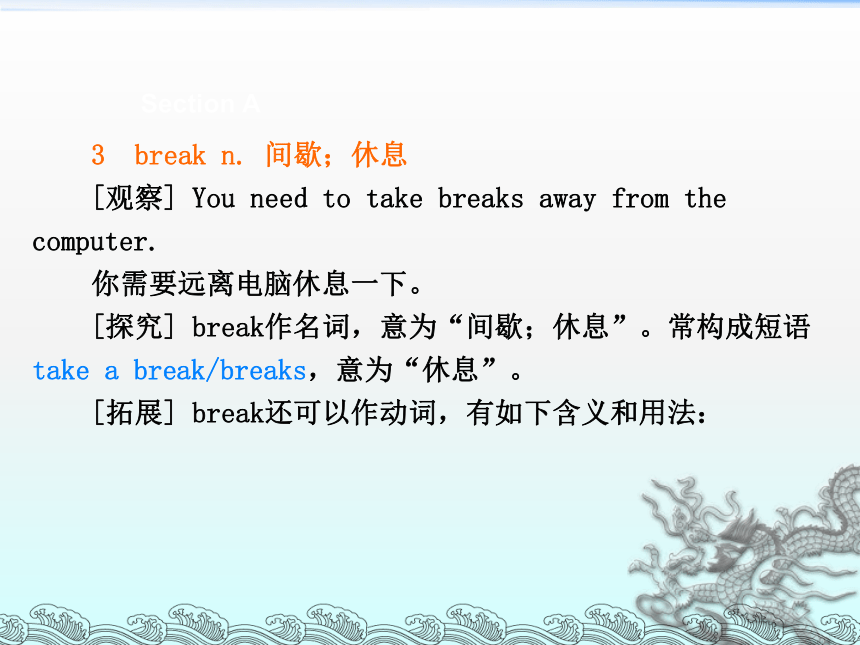
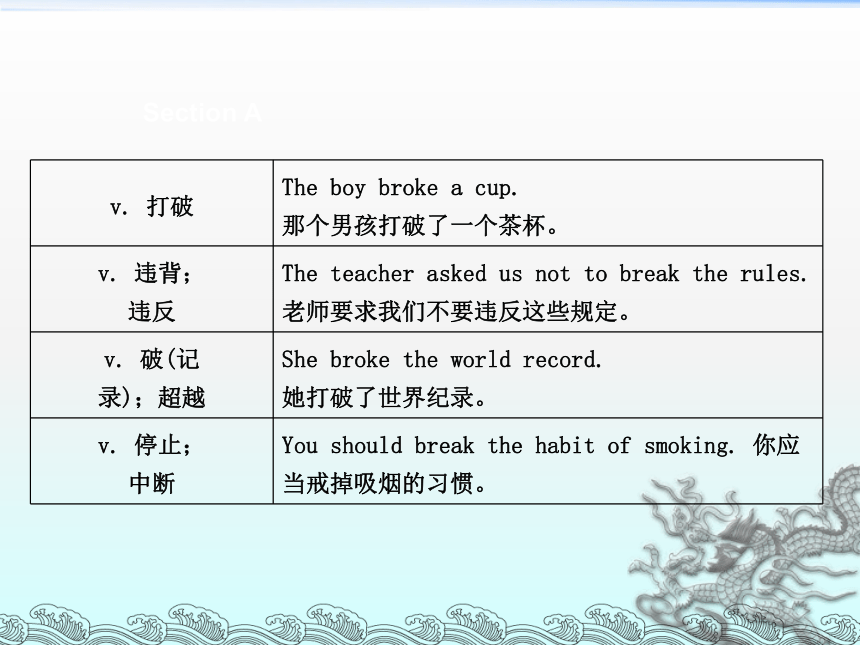
文档简介
(共40张PPT)
自 主 预 习
Section A
短语互译 1.感冒______________________
2.躺下_______________
3. 量体温______________________________
4.发烧_______________________
5.下车_______________________
6. 令某人惊讶的是___________________________
7.等待__________________________
8.同意做某事____________________
9.及时_______________________
10.跌倒;摔倒_____________________
have a cold
lie down
take one's temperature
have a fever
get off
to one's surprise
wait for
agree to do sth
in time
fall down
Section A
短语互译 11.take breaks / a break _______
12.right away _________________
13.see a dentist ________________
14.get into trouble ______________
15.think about ____________
休息
立即;马上
看牙医
陷入麻烦
考虑
Section A
句型在线 1.朱迪怎么了?
_________ the _____________ _________ Judy
2.我应该量一下体温吗?
____________ ____ take my temperature
3.你需要远离电脑休息一下。
You ________ ______ take breaks _______ ________ the computer.
4.如果明天你的头和脖子仍然很痛的话,就去看医生吧。
_____ your head and neck still _______ tomorrow, then go to a doctor.
What's
matter
with
Should
I
need
to
away
from
If
hurt
Section A
句型在线 5.……那位司机看到一位老人正躺在马路边。
…the driver ______ an old man ________ on the side of the road.
6.多亏了王师傅和乘客们,医生们及时挽救了老人的生命。
_________ _______ Mr. Wang and the passengers, the doctors saved the man in time.
saw
lying
Thanks
to
互 动 探 究
词汇点睛
Section A
1 lie v. 躺;平躺
[观察] I think you should lie down and rest.
我认为你应该躺下休息一下。
[探究] lie作动词,意为“躺;平躺”,lie down意为“躺下”,此时lie的过去式是lay, 过去分词是lain。lie作“撒谎”讲时,其过去式和过去和过去分词均是lied。
[拓展] lie还有如下含义和用法:
Section A
v. 位于;
坐落于 Shanghai lies in the east of China.
上海位于中国的东部。
v. 撒谎 Don't believe her because she always lies. 别相信她,因为她总是说谎。
n. 谎言 We don't want to listen to such lies.
我们不想听这样的谎言。
Section A
活学活用
(1)医生建议我躺下休息。
The doctor advised me to _______ ________ and rest.
(2)你不应该撒谎。
You shouldn't ________ _________.
lie
down
tell
lies
Section A
2 rest n. & v. 放松;休息
[观察] I'm very tired and I need to have a good rest.
我很累,我需要好好休息一下。
[探究] rest可以作名词,也可以作__动__词,意为“放松;休息”。
[拓展] have a rest = take a rest = rest 休息
Section A
活学活用
医生建议我好好休息。
The doctor advised me to _____________ ____ ________ _______.
have/take
a
good
rest
Section A
3 break n. 间歇;休息
[观察] You need to take breaks away from the computer.
你需要远离电脑休息一下。
[探究] break作名词,意为“间歇;休息”。常构成短语take a break/breaks,意为“休息”。
[拓展] break还可以作动词,有如下含义和用法:
Section A
v. 打破 The boy broke a cup.
那个男孩打破了一个茶杯。
v. 违背;
违反 The teacher asked us not to break the rules. 老师要求我们不要违反这些规定。
v. 破(记
录);超越 She broke the world record.
她打破了世界纪录。
v. 停止;
中断 You should break the habit of smoking. 你应当戒掉吸烟的习惯。
Section A
活学活用
1.根据汉语意思完成句子
我们通常会在两节课之间短暂休息一会儿。
We usually ________ _______ ____________between two classes.
2.根据句意及汉语提示完成句子
She hopes to ____________(打破) the world record.
take
a
break
break
Section A
4 trouble n. 问题;苦恼
[观察] It's sad that many people don’t want to help others because they don't want any trouble.
令人悲伤的是,许多人不想帮助别人,因为他们不想招惹任何麻烦。
[探究] trouble是不可数名词,意为“问题;苦恼”。
[拓展] have trouble __doing__ sth.意为“做某事时遇到麻烦”。
They had trouble remembering new words.
他们在背生词时遇到了麻烦。
Section A
活学活用
2014·福州—Jack, I have________working out the math problem.
—Don't worry. Let me help you.
A.fun B. trouble C.experience
[解析] B 本题考查名词的词义理解。三个选项的含义分别是:fun乐趣;trouble问题;experience经历。结合本题场景可知,我在解答这道数学题时遇到了“麻烦”,故trouble符合题意。
Section A
短语归纳
1 have a cold 感冒
[观察] My elder brother had a bad cold last night.
我哥哥昨天晚上得了重感冒。
[探究] have a cold与get/catch a cold同义。表示“得重感冒”要用have/get/catch a bad cold。
[拓展] 常见的表示“患病”的短语有:
Section A
have a /
an +疾
病名词 have a cold 感冒
have a fever 发烧
have a cough 咳嗽
have a +
身体部位+
ache have a headache头痛
have a stomachache 胃痛
have a toothache 牙痛
have a
sore +身
体部分 have a sore throat 嗓子痛
have a sore back 背痛
Section A
活学活用
—I'm not feeling well. I have a ________.
—Maybe you should see a dentist.
A.cold B.toothache
C.headache D.fever
[解析] B 结合答语“或许你应该去看牙医”可知,对应的疾病是“牙痛”。故答案为B。
Section A
2 get off下车
[观察] He got off and asked the woman what happened.
他下车,问那个女人发生了什么事。
[探究] get off是固定搭配,意为“下车”,其反义短语是get on,意为“上车”。
[拓展] 常见的 get 短语有:
Section A
Section A
活学活用
2014·兰州 Good manners can make people________ each other.
A.get on well with B.get off
C.get over D.get away
[解析] A 本题考查get的短语搭配。四个选项的含义分别是:get on well with sb.表示“和某人和睦相处”;get off下车;get over克服;get away逃离。结合本题场景可知,举止得当能够使人们彼此之间和睦相处。故答案为A。
Section A
3 to one's surprise 令某人惊讶的是
[观察] But to his surprise, they all agreed to go with him.
但是,令他惊讶的是,他们都同意和他一起去。
[探究] to one's surprise意为“令某人惊讶的是”,其中surprise是名词,意为“惊讶;惊奇”。
[辨析] surprise, surprising与 surprised
Section A
surprise 可以作名词,意为“惊讶”;也可以作动词,意为“使惊讶”。
surprising 是以 ing结尾的形容词,意为“令人惊讶的”,常用来修饰事或物。
surprised 是以 ed结尾的形容词,意为“感到惊讶的”,常用来修饰人。
Section A
活学活用
1.根据汉语意思完成句子
令我父母惊讶的是,我独自完成了那项工作。
____ ____ __________ _____________, I finished the work by myself.
2.根据句意及汉语提示完成句子
2013·滨州 All of us were ___________ (惊奇的) that such a little girl spoke English so well.
To
my
parents'
surprise
surprised
Section A
句型透视
1 What's the matter?怎么了?
[探究] 本句用于询问病情,可翻译为“怎么了?”,若要询问“某人怎么了”要用“What's the matter with sb.”的结构。
[拓展] 表示“(某人)怎么了”的表达方式有:
Section A
Section A
活学活用
1.根据汉语意思及英文提示翻译句子
2013·福州你的电脑出了什么问题? (matter)
________________________________________________
2.单项选择
2014·云南—You look really tired. ________?
—I didn't sleep well last night. I had a headache.
A. How about you B. What should I do
C. What's the matter D. How are you feeling now
What‘s the matter with your computer?
[解析] C 本题考查交际用语。结合本题场景可知,所缺的句子是C,用于询问“怎么了”。
Section A
2 Should I take my temperature
我应该量一下体温吗?
[探究] should常用来提出建议。take one's temperature 意为“量体温”。
[拓展] take可以和一些名词构成短语搭配。常见的有:
Section A
活学活用
1.翻译句子
你应该先量你的体温。
_____________________________________________.__
2.根据汉语意思完成句子
你应该尽力独立完成你的家庭作业。
You __________ ________ to finish your homework by yourself.
You should take your temperature first
should
try
Section A
3. You need to take breaks away from the computer. 你需要远离电脑休息一下。
[探究] (1)need to do sth.是固定搭配,意为“需要做某事”,其中need是行为动词,意为“需要”。如:
I need to translate it into English.
我需要把它译成英语。
(2)其中away from表示“远离”。如:
She lives three miles away from her school.
她住在离学校三英里远的地方。
[拓展] 和away from有关的其他表达和用法:stay/keep away from 远离;be away from离开。
Section A
活学活用
1.根据汉语意思完成句子
你去森林的时候,需要带一张地图。
You _________ _____ ________ a map when you go to the forest.
need
to
take
Section A
2.单项选择
2013·泸州She________ her hometown since she was 18 years old. She told me she would return soon.
A. has left B. has been away from
C. left D. went away
[解析] B 由“since she was 18 years old”可知,要用现在完成时,先排除C和D;leave意为“离开”,是非延续性动词,故要转换成be away from。故答案为B。
Section A
4. If your head and neck still hurt tomorrow, then go to a doctor. 如果明天你的头和脖子仍然很痛的话,就去看医生吧。
[探究] 本句是含条件状语从句的复合句,主句是then go to a doctor,从句是if your head and neck still hurt tomorrow,其中if是连词,意为“如果;假如”。
[注意] 在if引导的条件状语从句中,如果主句是祈使句或一般将来时,从句要用一般现在时来代替将来时。如:
I will call you if I am free.
如果我有空,我会给你打电话的。
Section A
活学活用
2014·泸州If you________ tomorrow, I will let you know all about it.
A.will come B. come
C. came D. comes
[解析] B 本题考查if引导的条件状语从句的时态。if引导条件状语从句时,如果主句是一般将来时,从句要用一般现在时。故答案为B。
Section A
5 …the driver saw an old man lying on the side of the road.
……那位司机看到一位老人正躺在马路边。
[探究] 本句中的saw an old man lying…属于“see sb. doing sth.”的固定搭配,此时强调动作正在进行。
[辨析] see sb. doing sth.与see sb. do sth.
see sb.
doing sth. 意为“看到某人正在做某事”,此时强调动作正在进行。
see sb.
do sth. 意为“看到某人做某事”,此时强调动作经常发生或看到某事发生的全过程。
Section A
I saw a thief running out of the shop.
我看到一个小偷正从商店里跑出来。
I saw a thief run out of the shop and get on the bus. 我看到一个小偷从商店里跑出来,上了公共汽车。
Section A
活学活用
2014·黄石—Where's Tony now
—I saw him ________ in the garden a moment ago and I told him ________.
A. play; go home B. playing; to go home
C. to play; goes home D. play; going home
[解析] B 本题考查非谓语动词的用法。“see sb. do sth.”和“see sb. doing sth.”都是正确的搭配,强调“看到某人正在做某事”时要用“see sb. doing sth.”的结构;tell sb. to do sth.表示“告诉某人做某事”。
Section A
6 Thanks to Mr. Wang and the passengers, the doctors saved the man in time.
多亏了王师傅和乘客们,医生们及时挽救了老人的生命。
[探究] (1)thanks to为介词短语,可接名词、代词、动名词等。此短语表示原因,意为“由于,多亏了”。如:
Thanks to the English language, we can learn a lot from other countries.多亏了英语这门语言,我们能从其他国家学到很多东西。
Section A
[拓展] thanks for意为“因……而感谢”,其中thanks相当于 thank you,for强调为何而感谢,其后可接名词或动名词。 如:
Thanks for inviting us to your birthday party.
谢谢你邀请我们参加你的生日聚会。
Section A
活学活用
2013·绥化________ the teacher, I’ve made great progress.
A. Thank you B. Thanks C. Thanks to
[解析] C 句意为“多亏了这位老师,我取得了很大的进步”,由此可知thanks to符合题意。
自 主 预 习
Section A
短语互译 1.感冒______________________
2.躺下_______________
3. 量体温______________________________
4.发烧_______________________
5.下车_______________________
6. 令某人惊讶的是___________________________
7.等待__________________________
8.同意做某事____________________
9.及时_______________________
10.跌倒;摔倒_____________________
have a cold
lie down
take one's temperature
have a fever
get off
to one's surprise
wait for
agree to do sth
in time
fall down
Section A
短语互译 11.take breaks / a break _______
12.right away _________________
13.see a dentist ________________
14.get into trouble ______________
15.think about ____________
休息
立即;马上
看牙医
陷入麻烦
考虑
Section A
句型在线 1.朱迪怎么了?
_________ the _____________ _________ Judy
2.我应该量一下体温吗?
____________ ____ take my temperature
3.你需要远离电脑休息一下。
You ________ ______ take breaks _______ ________ the computer.
4.如果明天你的头和脖子仍然很痛的话,就去看医生吧。
_____ your head and neck still _______ tomorrow, then go to a doctor.
What's
matter
with
Should
I
need
to
away
from
If
hurt
Section A
句型在线 5.……那位司机看到一位老人正躺在马路边。
…the driver ______ an old man ________ on the side of the road.
6.多亏了王师傅和乘客们,医生们及时挽救了老人的生命。
_________ _______ Mr. Wang and the passengers, the doctors saved the man in time.
saw
lying
Thanks
to
互 动 探 究
词汇点睛
Section A
1 lie v. 躺;平躺
[观察] I think you should lie down and rest.
我认为你应该躺下休息一下。
[探究] lie作动词,意为“躺;平躺”,lie down意为“躺下”,此时lie的过去式是lay, 过去分词是lain。lie作“撒谎”讲时,其过去式和过去和过去分词均是lied。
[拓展] lie还有如下含义和用法:
Section A
v. 位于;
坐落于 Shanghai lies in the east of China.
上海位于中国的东部。
v. 撒谎 Don't believe her because she always lies. 别相信她,因为她总是说谎。
n. 谎言 We don't want to listen to such lies.
我们不想听这样的谎言。
Section A
活学活用
(1)医生建议我躺下休息。
The doctor advised me to _______ ________ and rest.
(2)你不应该撒谎。
You shouldn't ________ _________.
lie
down
tell
lies
Section A
2 rest n. & v. 放松;休息
[观察] I'm very tired and I need to have a good rest.
我很累,我需要好好休息一下。
[探究] rest可以作名词,也可以作__动__词,意为“放松;休息”。
[拓展] have a rest = take a rest = rest 休息
Section A
活学活用
医生建议我好好休息。
The doctor advised me to _____________ ____ ________ _______.
have/take
a
good
rest
Section A
3 break n. 间歇;休息
[观察] You need to take breaks away from the computer.
你需要远离电脑休息一下。
[探究] break作名词,意为“间歇;休息”。常构成短语take a break/breaks,意为“休息”。
[拓展] break还可以作动词,有如下含义和用法:
Section A
v. 打破 The boy broke a cup.
那个男孩打破了一个茶杯。
v. 违背;
违反 The teacher asked us not to break the rules. 老师要求我们不要违反这些规定。
v. 破(记
录);超越 She broke the world record.
她打破了世界纪录。
v. 停止;
中断 You should break the habit of smoking. 你应当戒掉吸烟的习惯。
Section A
活学活用
1.根据汉语意思完成句子
我们通常会在两节课之间短暂休息一会儿。
We usually ________ _______ ____________between two classes.
2.根据句意及汉语提示完成句子
She hopes to ____________(打破) the world record.
take
a
break
break
Section A
4 trouble n. 问题;苦恼
[观察] It's sad that many people don’t want to help others because they don't want any trouble.
令人悲伤的是,许多人不想帮助别人,因为他们不想招惹任何麻烦。
[探究] trouble是不可数名词,意为“问题;苦恼”。
[拓展] have trouble __doing__ sth.意为“做某事时遇到麻烦”。
They had trouble remembering new words.
他们在背生词时遇到了麻烦。
Section A
活学活用
2014·福州—Jack, I have________working out the math problem.
—Don't worry. Let me help you.
A.fun B. trouble C.experience
[解析] B 本题考查名词的词义理解。三个选项的含义分别是:fun乐趣;trouble问题;experience经历。结合本题场景可知,我在解答这道数学题时遇到了“麻烦”,故trouble符合题意。
Section A
短语归纳
1 have a cold 感冒
[观察] My elder brother had a bad cold last night.
我哥哥昨天晚上得了重感冒。
[探究] have a cold与get/catch a cold同义。表示“得重感冒”要用have/get/catch a bad cold。
[拓展] 常见的表示“患病”的短语有:
Section A
have a /
an +疾
病名词 have a cold 感冒
have a fever 发烧
have a cough 咳嗽
have a +
身体部位+
ache have a headache头痛
have a stomachache 胃痛
have a toothache 牙痛
have a
sore +身
体部分 have a sore throat 嗓子痛
have a sore back 背痛
Section A
活学活用
—I'm not feeling well. I have a ________.
—Maybe you should see a dentist.
A.cold B.toothache
C.headache D.fever
[解析] B 结合答语“或许你应该去看牙医”可知,对应的疾病是“牙痛”。故答案为B。
Section A
2 get off下车
[观察] He got off and asked the woman what happened.
他下车,问那个女人发生了什么事。
[探究] get off是固定搭配,意为“下车”,其反义短语是get on,意为“上车”。
[拓展] 常见的 get 短语有:
Section A
Section A
活学活用
2014·兰州 Good manners can make people________ each other.
A.get on well with B.get off
C.get over D.get away
[解析] A 本题考查get的短语搭配。四个选项的含义分别是:get on well with sb.表示“和某人和睦相处”;get off下车;get over克服;get away逃离。结合本题场景可知,举止得当能够使人们彼此之间和睦相处。故答案为A。
Section A
3 to one's surprise 令某人惊讶的是
[观察] But to his surprise, they all agreed to go with him.
但是,令他惊讶的是,他们都同意和他一起去。
[探究] to one's surprise意为“令某人惊讶的是”,其中surprise是名词,意为“惊讶;惊奇”。
[辨析] surprise, surprising与 surprised
Section A
surprise 可以作名词,意为“惊讶”;也可以作动词,意为“使惊讶”。
surprising 是以 ing结尾的形容词,意为“令人惊讶的”,常用来修饰事或物。
surprised 是以 ed结尾的形容词,意为“感到惊讶的”,常用来修饰人。
Section A
活学活用
1.根据汉语意思完成句子
令我父母惊讶的是,我独自完成了那项工作。
____ ____ __________ _____________, I finished the work by myself.
2.根据句意及汉语提示完成句子
2013·滨州 All of us were ___________ (惊奇的) that such a little girl spoke English so well.
To
my
parents'
surprise
surprised
Section A
句型透视
1 What's the matter?怎么了?
[探究] 本句用于询问病情,可翻译为“怎么了?”,若要询问“某人怎么了”要用“What's the matter with sb.”的结构。
[拓展] 表示“(某人)怎么了”的表达方式有:
Section A
Section A
活学活用
1.根据汉语意思及英文提示翻译句子
2013·福州你的电脑出了什么问题? (matter)
________________________________________________
2.单项选择
2014·云南—You look really tired. ________?
—I didn't sleep well last night. I had a headache.
A. How about you B. What should I do
C. What's the matter D. How are you feeling now
What‘s the matter with your computer?
[解析] C 本题考查交际用语。结合本题场景可知,所缺的句子是C,用于询问“怎么了”。
Section A
2 Should I take my temperature
我应该量一下体温吗?
[探究] should常用来提出建议。take one's temperature 意为“量体温”。
[拓展] take可以和一些名词构成短语搭配。常见的有:
Section A
活学活用
1.翻译句子
你应该先量你的体温。
_____________________________________________.__
2.根据汉语意思完成句子
你应该尽力独立完成你的家庭作业。
You __________ ________ to finish your homework by yourself.
You should take your temperature first
should
try
Section A
3. You need to take breaks away from the computer. 你需要远离电脑休息一下。
[探究] (1)need to do sth.是固定搭配,意为“需要做某事”,其中need是行为动词,意为“需要”。如:
I need to translate it into English.
我需要把它译成英语。
(2)其中away from表示“远离”。如:
She lives three miles away from her school.
她住在离学校三英里远的地方。
[拓展] 和away from有关的其他表达和用法:stay/keep away from 远离;be away from离开。
Section A
活学活用
1.根据汉语意思完成句子
你去森林的时候,需要带一张地图。
You _________ _____ ________ a map when you go to the forest.
need
to
take
Section A
2.单项选择
2013·泸州She________ her hometown since she was 18 years old. She told me she would return soon.
A. has left B. has been away from
C. left D. went away
[解析] B 由“since she was 18 years old”可知,要用现在完成时,先排除C和D;leave意为“离开”,是非延续性动词,故要转换成be away from。故答案为B。
Section A
4. If your head and neck still hurt tomorrow, then go to a doctor. 如果明天你的头和脖子仍然很痛的话,就去看医生吧。
[探究] 本句是含条件状语从句的复合句,主句是then go to a doctor,从句是if your head and neck still hurt tomorrow,其中if是连词,意为“如果;假如”。
[注意] 在if引导的条件状语从句中,如果主句是祈使句或一般将来时,从句要用一般现在时来代替将来时。如:
I will call you if I am free.
如果我有空,我会给你打电话的。
Section A
活学活用
2014·泸州If you________ tomorrow, I will let you know all about it.
A.will come B. come
C. came D. comes
[解析] B 本题考查if引导的条件状语从句的时态。if引导条件状语从句时,如果主句是一般将来时,从句要用一般现在时。故答案为B。
Section A
5 …the driver saw an old man lying on the side of the road.
……那位司机看到一位老人正躺在马路边。
[探究] 本句中的saw an old man lying…属于“see sb. doing sth.”的固定搭配,此时强调动作正在进行。
[辨析] see sb. doing sth.与see sb. do sth.
see sb.
doing sth. 意为“看到某人正在做某事”,此时强调动作正在进行。
see sb.
do sth. 意为“看到某人做某事”,此时强调动作经常发生或看到某事发生的全过程。
Section A
I saw a thief running out of the shop.
我看到一个小偷正从商店里跑出来。
I saw a thief run out of the shop and get on the bus. 我看到一个小偷从商店里跑出来,上了公共汽车。
Section A
活学活用
2014·黄石—Where's Tony now
—I saw him ________ in the garden a moment ago and I told him ________.
A. play; go home B. playing; to go home
C. to play; goes home D. play; going home
[解析] B 本题考查非谓语动词的用法。“see sb. do sth.”和“see sb. doing sth.”都是正确的搭配,强调“看到某人正在做某事”时要用“see sb. doing sth.”的结构;tell sb. to do sth.表示“告诉某人做某事”。
Section A
6 Thanks to Mr. Wang and the passengers, the doctors saved the man in time.
多亏了王师傅和乘客们,医生们及时挽救了老人的生命。
[探究] (1)thanks to为介词短语,可接名词、代词、动名词等。此短语表示原因,意为“由于,多亏了”。如:
Thanks to the English language, we can learn a lot from other countries.多亏了英语这门语言,我们能从其他国家学到很多东西。
Section A
[拓展] thanks for意为“因……而感谢”,其中thanks相当于 thank you,for强调为何而感谢,其后可接名词或动名词。 如:
Thanks for inviting us to your birthday party.
谢谢你邀请我们参加你的生日聚会。
Section A
活学活用
2013·绥化________ the teacher, I’ve made great progress.
A. Thank you B. Thanks C. Thanks to
[解析] C 句意为“多亏了这位老师,我取得了很大的进步”,由此可知thanks to符合题意。
同课章节目录
- Unit 1 What's the matter?
- Section A
- Section B
- Unit 2 I'll help to clean up the city parks.
- Section A
- Section B
- Unit 3 Could you please clean your room?
- Section A
- Section B
- Unit 4 Why don't you talk to your parents?
- Section A
- Section B
- Unit 5 What were you doing when the rainstorm came
- Section A
- Section B
- Review of Units 1-5
- Unit 6 An old man tried to move the mountains.
- Section A
- Section B
- Unit 7 What's the highest mountain in the world?
- Section A
- Section B
- Unit 8 Have you read Treasure Island yet?
- Section A
- Section B
- Unit 9 Have you ever been to a museum?
- Section A
- Section B
- Unit 10 I've had this bike for three years.
- Section A
- Section B
